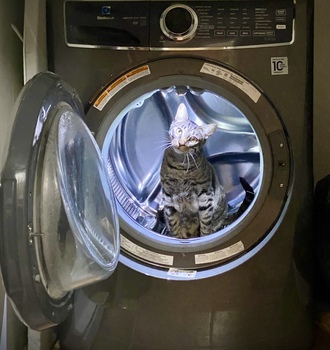The Future is Dumb
"To keep your face expressionless was not difficult, and even your breathing could be controlled, with an effort: but you could not control the beating of your heart, and the telescreen was quite delicate enough to pick it up." -- Nineteen Eighty-Four, George Orwell (June 8, 1949)
To be absolutely clear: your smart devices are spying on you. Your thermostat, your television, your robot vacuum, your smartphone, everything. It's in their nature. They have microphones, they have cameras, they have touchscreens, they have other sensors. They know what you're writing, watching, doing. They know who you're sleeping with. They know the location of the secret military base you work at.
In and of itself, this isn't a bad thing.
Your cat or dog or barber knows most of these things. Your assistant, if you are blessed enough to have one, knows all of that stuff - and much more. The problem begins when those smart devices start gossiping.
Every piece of smart technology you allow into your home is as much a spy as it is a convenience. It observes your behaviour, eavesdrops on your life, and often sends that gossip back to a central server. The device's true owner - its manufacturer - can turn around and sell you, as with all of their customers, to advertisers, as a valuable data product.
They profit not only off your purchase, but also from your daily life, and that of your family. In fact, the profit they earn from selling this data is enough for them to opt NOT to profit from the sale of their technology; they may choose sell it at a loss, simply to get that first data-vampire invitation into your household.
In some cases, if you try and cut off that gossip, the device will entirely stop working. The manufacturer can't tolerate that. They can't monetize it. So they may disallow it entirely.
Furthermore, the onboard software can be coerced into gossiping to other cloud servers, in other countries, for other companies or groups. Sometimes this can be through ads. Other times, it can be due to software vulnerabilities being exploited. Unfortunately, those companies and groups and manufacturers, they gossip too. They often earn a profit from it. And they'll gossip to anyone. Credit card companies. Advertisers. Spy agencies. Or, worst of all, Spotify Wrapped.
The truth is, much of what gets billed as "smart technology" would more accurately be described as "narc technology". Some of it is opt-in, some of it isn't. And like it or not, you really should make an effort to protect yourself.
This is the state of things, and we can't let it go on. We need to resist the data vampires. We need to embrace a tiny bit of discomfort (for now), until those companies and groups start behaving respectfully with our data.
How Can We Protect Ourselves?
There are a few ways to push back against being exploited this way.
On the personal front, you can make choices that steer away from "smart" technology.
The Television Dilemma
Buying a new TV? Smart TVs are the cheapest options, because their manufacturers subsidize the costs by exploiting your data. A more expensive option is to try and find non-exploitative TVs such as kiosk displays.
The simpler option is to buy the subsidized Smart TV, and then never connect it to the Internet. You'll want to watch streaming services on the TV, of course, so for that you would buy a separate dedicated machine such as an Apple TV or a FireTV Stick or a Roku.
If the streaming device acts up, you can throw it out a window. That's much easier and cheaper than defenestrating an entire TV.
Smart Gadgets
Smart TVs aren't the only smart technology, though. Thermostats, rice cookers, garage door openers, lightbulbs - there are many such devices out there. For these devices, you'll want to explore self-hosting.
Self-hosting with tools like Home Assistant requires more effort than blindly trusting strangers, and has a steeper learning curve. However, once you get into it, you'll find that it's kind of an adventure on its own. And it's empowering to know that you have full control.
Cars. Oh my.
Okay, I don't have a good answer for how to protect yourselves from invasive car computers. Most modern cars, especially electric ones, seem to be hard-wired to talk to Big Brother (regardless of whether it's GMC, Elon Musk, or some HQ in China or Vietnam or South Korea). Maybe, if we're lucky, options like the Slate EV will buck that trend by being too simple to have onboard spyware.
I'm not holding my breath.
My approach has been to hold back on buying a new car: my newest car is 15 years old!
Instead, I purchased an e-bike and have been using that as much as possible. I've ridden over 2500 KM on my e-bike since purchasing it in 2022. Considering I work from home & don't have a commute, I'm quite happy with that number. However, I do use Strava's free version for tracking my rides, which is a whole other discussion for another day.
So, the best I can do for car advice is to explore alternative transportation. I don't like that both of my cars are gas-powered, I definitely want to go PHEV or Full EV, but that's not an option for now.
But what about stopping these companies?
I think we need to establish some sort of Consumer Protection seal of approval. A certification that companies and their products are not only protecting users, but also ensuring that devices continue to work even if the company happens to go belly-up.
The conversation around Right to Repair is part of this. Consumers should have the right to upgrade their devices' software themselves, to repair their devices and vehicles themselves, and not be beholden to the manufacturer at every turn.
But that's just one part of the problem.
Consumers should actually own the things that they purchase.
If the company can reach in and brick your device, then you're not an owner. You're a renter - a serf.
If the company can tap into the data and use it to nefarious ends, then you're not an owner. You're a victim.
If the company going out of business renders your device useless, then you're not an owner. You're fucked.
This mistreatment of consumers has been going on for too long, and we need to take a stand against it.
We need to boycott the companies and products that perpetuate these issues, until they start behaving more responsibly.
And if they can't get their on their own, then these companies should be forced to have a plan in place to sunset their operations in a more responsible manner. They should be forced to treat customer data responsibly. They should be forced to let people own what they're selling.
Until such time that these problems are solved, here is my advice:
- Don't
- Use
- Machiavellian*
- Bullshit
If the company providing your smart device is putting their own needs above yours, and above general ethical behaviour, toss them to the curb.
And so, so many companies are doing that these days.
The future is DUMB.
Catch you on the flip side.
* I was originally going to say "Megacorp" here, but the truth is, megacorporations are only part of the problem. Rough-and-tumble startups, clamouring for runway from VCs and always a moment away from collapse, are also a big issue. They need to have a better framework to follow for responsible consumer treatment, as a baseline for being permitted to do business.
Published: July 20, 2025
Tags: opinion, hardware, smart technology
<busker-box>
Thank you for reading!
If you enjoyed this post, please consider supporting me on Ko-Fi. Monthly Supporters get early access to my writing and updates on my hobby projects.
To be notified of new posts on Whateverthing, please follow the RSS feed:
subscribe to the rss feed
</busker-box>
 About Me
About Me
